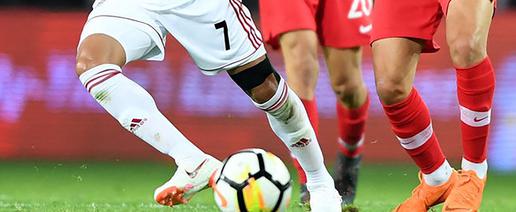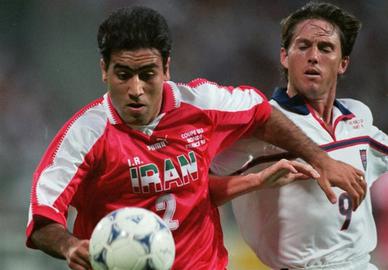The repercussions of US sanctions following President Trump’s exit from the nuclear agreement are already being felt — at the 2018 World Cup in Russia.
US sporting apparel company Nike announced on June 4 that it will not provide shoes to members of Iran's National Football Team for the World Cup because of US sanctions. Nike's main rival, Germany-based Adidas, which has been responsible for the uniforms of the Iranian team, also announced that it would not offer Iranian jerseys for sale to the public. And the International Federation of Association Football (FIFA) official store, which sells the uniforms of all the teams competing at the World Cup, has told shoppers to buy Iranian football outfits from Iran’s Football Federation.
During the 2014 World Cup in Brazil, Iran was under the most stringent sanctions, and yet it did not have to deal with these problems. Why this time around?
The reasons are legal — and Iran is the only team that has to deal with problems of this nature.
Sanctions on the Playing Field
Nike is based in the Pacific Northwest state of Oregon and, as an American entity, all laws and rules relating to US sanctions on Iran apply to the company and its products. According to these laws, no US citizen or company can make commercial deals with Iranian citizens or companies. Violators are subject to fines or even prison sentences. Many of these sanctions are unrelated to the nuclear agreement, officially known as the Joint Comprehensive Plan of Action (JCPOA), and, therefore, they were not lifted even when that agreement was intact, with the US as a signatory.
The goal of these particular sanctions has been to limit Iranian access to American products and services. If, for whatever purposes, an American company wants to have commercial dealings with Iran, it must secure a permit from the US Treasury Department to ensure it stays out of the courts.
Shoes worn by players of the national football team are not considered to be part of their official uniform. Players can choose their own shoes or sign a contract with a company to supply them with shoes. Sports apparel companies use such deals as an opportunity to advertise their products at popular games. In return, players not only get free products, but are also paid considerable sums for their help in promoting these products.
Nike did not hold a permit from the Treasury Department to deal with Iran, or to sell its products to Iranian citizens, so it cannot enter into contracts with Iran’s players — even though this ban does not apply to expatriate athletes of Iranian origin. For example, Nike had a contract with Saman Ghoddos, a Swedish-born Iranian dual national, to supply him with shoes to showcase its newest styles, but after he accepted the offer to play for Iran’s national team, Nike broke off the contract to ward off possible punishments.
And yet one might have noticed that Iranian footballers were wearing Nike shoes during the 2014 World Cup. This is because Iranian footballers are free to buy shoes or any other Nike products from stores and wear them when playing for Iran’s national team, even at the World Cup in Russia. Players are not banned from wearing merchandise from any company; Nike and other American companies are simply not allowed to sign contracts to provide products to members of the Iranian team.
In Tehran and other Iranian cities, some shops advertise and sell authentic Nike merchandise, but none of them are official representatives for Nike USA, Inc. — again, because the company is not allowed to have such representatives in Iran. The products are usually brought into the country informally, arriving in the suitcases of travelers who make a living, or supplement their income, by doing so.
In previous World Cups, members of Iran’s National Football Team who played for foreign clubs had a contract with an American company, so the situation was different from this year’s World Cup in Russia. For the most part, Iranian players have contracts with European sportswear companies such as the German-based Puma. American domestic laws on sanctions do not apply to them and they can enter into contracts with Iranian players without having to worry about the consequences.
A Self-Made “Sanction”
But why is Adidas AG, a German company, now refusing to offer Iranian kits for sale to the public? And why will FIFA not sell them on its official site?
As a German company, Adidas does not have to worry about sanctions-related US domestic laws. If sanctions did create obstacles for contracts between Adidas and Iran’s Football Federation, then no contract would have been signed in the first place. But the Iranian team jersey is the only official jersey not available at Adidas stores. Why?
The reason is simple: Iran has not joined international copyright conventions that protect intellectual property. In its contract with Iran’s Football Federation, Adidas requires the usual clause to protect its logo and label and enforce its right as the sole supplier of a national team’s uniform. This is put in place to ensure counterfeit products bearing the Adidas logo and label generate as little income as possible.
But since Iran is not a signatory to copyright conventions, it is not obligated to enforce intellectual property rights. And Iran’s Football Federation has no power to enforce copyright laws, even on a limited basis, so it cannot prevent the sale of counterfeit Adidas products. As a result, Adidas decided to supply only the Iranian national team with the uniforms and refused to make them available to the general public. Making them available would have forced the company to compete against cheap knockoffs.
In previous World Cups, Iran acquired its national team uniforms through contracts with less reputable and little-known sportswear companies — businesses that did not view counterfeits as a threat to their prestige. In the 2014 World Cup in Brazil, a number of Iranian footballers complained about their outfits and some even referred to them as “counterfeits.”
Nike’s refusal to supply an Iranian footballer with shoes was a result of US sanctions, whereas Adidas’ refusal to offer the uniforms to the public was a result of the Iranian government’s own refusal to join copyright conventions. Regardless, both realities have put Iran’s national team in an awkward position, especially when compared with the other 31 teams competing this year in Russia.
visit the accountability section
In this section of Iran Wire, you can contact the officials and launch your campaign for various problems


























comments